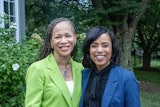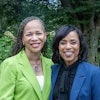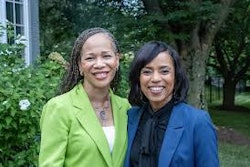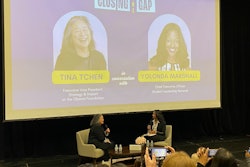Higher education observers consistently note that a number of presidents will be stepping down or retiring over the next decade, paving the way for up-and-coming leaders to carry on the work for student success and completion.
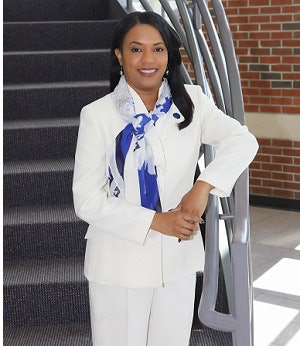 Dr. Karrie G. Dixon
Dr. Karrie G. DixonAt historically Black colleges and universities, particularly, a cohort of younger presidents and chancellors has entered the space with a vision to propel their institutions forward. Although younger than the “traditional” college president, the leaders bring with them years of higher education experience and they are leveraging relationships with government, industry and older presidential mentors to address some of the challenges that many HBCU presidents collectively face: enrollment growth, student success, fundraising, access and affordability and financial stability.
As chancellor of Elizabeth City State University, Dr. Karrie G. Dixon, 44, notes that her experiences in higher education have shaped her philosophy to serving students more so than her age. Her trajectory to the chancellorship involved six years of teaching at the collegiate level, service in an administrative capacity at the University of North Carolina System office working with more than 17 public universities in the state — five of which were HBCUs, — and participation in professional development opportunities such as the American Association of State Colleges and Universities’ Millennium Leadership Initiative and an American Council on Education fellowship.
“These experiences have influenced the way I prioritize my understanding of what students need and want to be successful,” Dixon said. “I have a clear-eyed perspective of the ever-changing needs to foster student success in higher education, which has been invaluable.”
For Dixon, her service as the seventh chancellor of the North Carolina-based HBCU involves intentionally creating an environment where students love where they live and learn, which is imperative to their success, she said. She believes it is important to bring a lot of energy to her role in order to relate to her students and be visible on campus.
She can be found attending academic and social events with students throughout the year.
“Students enjoy seeing me around campus, and I definitely enjoy interacting with them,” Dixon said. “One of the benefits of being a smaller institution is it allows me to know the students’ names, their interests and their involvement. They are a part of this community, and they are valued.”
To grow enrollment, enhance institutional sustainability, increase fundraising and increase ECSU’s visibility and access, university leaders have made it a priority to expand the institutions’ degree program inventory, expand online course offerings, establish strategic partnerships with the state’s 58 community colleges and the military and enhance the infrastructure of the university with building renovations, campus beautification projects and technology enhancements to improve students’ overall experience.
“Students have options and they want amenities. It is sometimes a challenge for HBCUs to compete in that space, so we have to be able to sell a different type of experience for students,” Dixon said. “I am committed to advocating for these types of enhancements and ensuring that we can create the best experience for our students, faculty, staff and community.”
ECSU benefits from being one of three universities in the state chosen to implement the NC Promise Tuition Initiative, making tuition $500 per semester for state residents and $2,500 for out-of-state students. Affordable tuition along with relevant degree programs catered to student interests and industry needs provide a unique opportunity for Dixon to recruit not only students coming from high school but also transfer students, working learners, veterans and more, she says. For example, the university has the first and only four-year degree program in aviation science in North Carolina.
“I never imagined I would be a chancellor buying airplanes and building a fleet of airplanes,” she said. “When I started we had two planes. In the last 12 months, we have grown our fleet to 11 airplanes. Without a doubt, we are meeting a significant industry demand.”
Setting an institution-wide expectation for accountability, commitment and excellence at ECSU from the beginning of her tenure, Dixon ensures that faculty, staff, alumni, internal and external stakeholders and other community members know how valuable they are to the success of the university and its students. “Everyone at ECSU matters and the work they do is important,” she said. “No matter who they are at the institution – faculty, staff or student – it is important they see me as a resource, supporter, advocate and leader.”
A product of an HBCU
A. Zachary Faison Jr., president of Edward Waters College, admitted that initially, he was in no way “starry eyed” about serving at the helm of a small, private historically Black college, one of the toughest and most challenging environments to work in higher education.
But taking into account the “tremendous” and “life-altering” experience he had as a student and graduate of Albany State University, an HBCU in Georgia, and the advice of colleagues, mentors and family members to serve, Faison saw the presidency as an opportunity to fulfill a responsibility to work towards collective community upliftment through HBCUs.
 A. Zachary Faison at an Edward Waters College event.
A. Zachary Faison at an Edward Waters College event.In taking on the role at EWC, Faison has made an effort to mirror the positive behaviors of presidents — older and younger — that have produced “demonstrably successful results at and for their respective institutions,” he said. “At the same time, I think I’ve also tried to glean insight into behaviors that were equally ineffective during other presidential tenures and tried to learn [from] and avoid some of those missteps.”
The philosophy at EWC is that student success must be at the forefront of every decision leaders make, says Faison, who previously served as general counsel and vice president of external affairs at Tuskegee University. He does not apologize when he shares in front of other stakeholders or faculty that “students are our most important constituency,” he said.
This philosophy has been shaped by Faison’s own student experiences and by watching other leaders in the space commit to personally engaging and cultivating relationships with students, he said.
As one of the youngest HBCU presidents, Faison, at age 39, added that there may be some measure of advantage that younger presidents have in recruiting and retaining younger generations of students, particularly as it relates to establishing a highly relevant campus experience.
Part of his engagement with EWC students entails interacting with them on social media, sitting down with them in the residence halls and cafeteria and cheering them on in their endeavors. His presence on social media and on campus allows students to have direct access to him and allows him to keep a “pulse” of student experiences, Faison said.
“As a millennial born in the 1980s, my generation and now the post-millennials that are our current students are largely defined by a desire to ‘be heard’ and feel ‘understood’ in terms of their expectations from the collegiate experience,” Faison said. “In general terms, ascertaining those student desires and expectations may very well be an easier lift for a younger president and again may lead to heightened retention and enrollment outcomes assuming that the attendant cultural competencies and connectedness filter through to shape a student culture of responsiveness and receptivity to student expectations at the institution on the whole.”
Even so, Faison said this possible advantage should not be overblown or overstated, as “age of the president notwithstanding, institutional issues of affordability, availability of scholarships and other financial resources, overall strength and relevancy of academic program offerings, student academic support and early intervention, student advising and student pre-collegiate academic and social preparedness remain the most dispositive and time-tested predominant factors leading to institutions achieving — or not achieving — positive student retention and enrollment outcomes.”
“With that said, I do believe that new and innovative delivery and implementation models being offered by new, young presidents to support student success can prove to be highly effective in translating to greater student retention and enrollment outcomes,” he noted.
Faison is tasked with bringing to life EWC’s recently approved strategic plan called “Eminence 2025.”
The plan aims to implement a vision to enhance the Jacksonville, Florida college’s academic profile through a new honors college, the launch of new online degree programs, the introduction of three new academic degree programs in social work, computer and information science and forensic science, and the development of the college’s first MBA, which will have to receive approval from the Southern Association of Colleges and Schools Commission on Colleges (SACSCOC).
In addition, the strategic plan will create financial viability through a sustainable and progressive institutional business model; it will foster a student-centered culture rooted in student leadership and development, student success and service, and student engagement and achievement; and it will bring about a culture of institutional philanthropic support while branding Edward Waters as a “best-in-class institution of distinction and emerging eminence,” Faison said.
“I am so grateful for the progressivism of the Board of Trustees at Edward Waters College for having the audacity to buck the proverbial trend in the HBCU community to give me an opportunity to lead as a young HBCU president,” he said. “Unfortunately, far too many state governing boards, private boards and selection committees remain allergic to youth as the demonstrated success of many younger presidents.”
Calling on seasoned mentors
The 42-year-old incoming president of Claflin University, Dr. Dwaun J. Warmack, says many of his mentors are still the scholars who invested in his growth as a higher education professional over the last two decades. He can pick up the phone today and connect with any of his mentors, he says.
Warmack, who was president of Harris-Stowe State University for five years before being tapped in May to lead Claflin, says that working at Harris-Stowe provided him an opportunity to “dream big and to grind hard to bring the dream to reality.” He previously held administrative roles at Bethune-Cookman University, Rhodes College in Memphis, Tennessee, Western Carolina University and Delta State University.
“I knew that I wanted to work in higher education so that I could provide young minds the same opportunity afforded me,” he said. “Coming from a non-traditional background and somewhat challenged upbringing, becoming a college president was not necessarily a specific goal. However, I knew that I wanted to become the change I wanted to see in my community and across the nation.”
Broadly speaking, Warmack said that the future of HBCUs is bright, raising a need for presidents who “are on fire to serve our student population, who are able to connect with students on many levels and who can be bold with their vision for the HBCU and its students, faculty and staff,” he added. “HBCUs will continue to grow with intentionality and continue to be a space that cultivates and educates students that desire a transformational educational experience.”
In the last few years, HSSU has grown its student profile, increased degree offerings from 14 to 50 majors, minors and certificate programs and increased its status as a leader in graduating African-American and other underrepresented groups with baccalaureate degrees. On campus, Warmack was actively involved in the student recruitment process, where he focused on connecting and engaging with students and their parents.
“I connected with the students instantly. I have been able to be my authentic self,” he said. “A quote that I live by is, ‘students don’t know that you care, until you show that you care.’ They believe and know that they can use their education as a pathway towards excellence while breaking generational curses of poverty and socioeconomic challenges.”
Outreach and engagement with students and their families saw HSSU receive more than 6,000 applications for admission last year, compared to 667 applications in 2013. Beyond enrollment, Warmack added that the campus experience is the “glue” that aids in the retention of today’s students.
“Students spend over 70 percent of their time outside the classroom and we make it a priority to ensure they are actively engaged on campus,” he said. “Including students in the decision making process ensures their buy-in and shared governance is at the forefront. From decisions related to homecoming, commencement speakers and institutional budget discussions, I make sure students are included in the process.”
Going forward, HSSU leaders plan to expand the institution’s footprint in the St. Louis region and globally. Officials are currently working on providing students with the global experiences they need to become productive citizens and global leaders, Warmack said, acknowledging that the institution’s progress and future rests on the past accomplishments set forth by experienced presidential predecessors.
“With that being said,” he said, “I have been fortunate to develop strategic strategies that integrates the past, embraces the relevant present and soars towards the future.”
Observers say that he will likely continue such traditions at Claflin.
Redefining the future
ECSU’s Dixon, like other young HBCU leaders, stands on the shoulders of many of the presidents and chancellors that served before her, she says, adding that she is fortunate to have a network of mentors across the country. She foresees more HBCUs being led by younger leaders in the future, especially as demographers project an “influx of retirements over the next three to five years,” she said.
“We have to acknowledge that senior leadership pipelines are going to be important when it comes to filling positions in the near future,” Dixon said, highlighting the responsibility of seasoned presidents and chancellors to groom those ready to take up the baton over the next decade. “The added experience and advice they can give the up-and-coming leaders will be critical to their success. We must be intentional about developing pipelines of prospective leaders who are ready to lead our great institutions.”
Faison mentioned leaders like Dr. Walter M. Kimbrough, Dr. Herman Felton, Dr. Makola Abdullah, Dr. Charlie Nelms, Dr. Dorothy Yancey, Dr. Portia H. Shields, Dr. Claude G. Perkins and Dr. Donna H. Oliver (his provost) as mentors to him in this work.
While he is hopeful that higher education will see a shift in the “prospective leadership paradigm” among those who select HBCU leaders, he believes it is a “steep climb” for some who serve as governing decision makers at HBCUs.
“Accordingly, the resultant implication is often talent drain or loss within the HBCU space as we are seeing a much higher number of young and very capable higher education professionals leave the HBCU community to go into PWI spaces or leave higher education altogether and venture into the private corporate or governmental sector,” he said.
Warmack brings it back to his own journey in higher education when offering advice to younger professionals coming into an HBCU presidency: grind and work hard and everything else will fall into place, he said.
“Now, that’s been refined in various ways, but I encourage the young professionals not to chase titles or money,” he said. “Do your best in the position that you are currently in. Develop and learn all of the competencies related to that position and everything else will work its way out.”
This article appeared in the July 11, 35th anniversary issue of Diverse.
